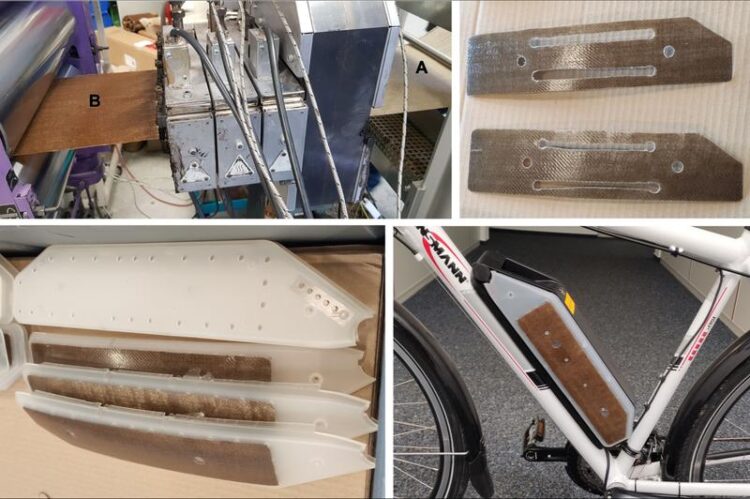Lightweight construction with natural fibre-reinforced plastics used for Li-ion battery housings

Thin organic sheets (B) are made from flax fabrics (A) and polypropylene to reinforce the housing panels of an e-bike battery.
© Ansmann AG & Fraunhofer LBF
To respond individual customer requirements and to meet social and political responsibility, a research project was carried out in cooperation between Ansmann AG and Fraunhofer Institute für Structural Durability and System Reliability LBF. Aim was the development of natural fibre-reinforced plastics for usage in Li-ion battery housings.
Fraunhofer Researchers will present more details at the Fraunhofer booth, Hall 7, SC01, at the “K-Messe” in Düsseldorf from October 19 to 26.
Current trends demonstrate the growing importance of sustainable products and production processes. Drivers here are not only emission regulations, but also the growing awareness of the environment and sustainability in society.
Therefore, more sustainable solutions are needed to transform the product as well as the value chain and product development.
Sustainable lightweight construction means innovative future technology. Researchers at the Fraunhofer LBF are deliberately pushing the limits of what is feasible. This results in property-optimized, lightweight structural solutions – always considering the reliability, sustainability, and affordability of the technical product solution.
Lightweight construction with natural fibre-reinforced plastics used for Li-ion battery housings
To respond individual customer requirements and to meet social and political responsibility, a research project was carried out in cooperation between Ansmann AG and the Fraunhofer LBF. Aim was the development of natural fibre-reinforced plastics for usage in Li-ion battery housings.
Due to their low density, good mechanical properties, low tendency to splinter and the comparatively low costs, while at the same time increasing sustainability, such natural fibre reinforced plastics were convincing as an alternative to glass or carbon fibre reinforcement.
Process to produce NFRP organic sheets with reduced thermal stress on the natural fibers
At the Fraunhofer LBF, a new process was developed to impregnate different natural fibre fabrics with plastic melt at reduced contact times and modify them according to requirements. Based on an adapted component design of the battery housing, to meet the numerous standards, local natural fibre reinforcements were integrated into the housing using an innovative injection moulding process.
Compared to the standard housing, the NFRP-Housing impresses with a weight reduction of 30 percent and a simultaneous increase in rigidity of 15 percent, while at the same time addressing the principle of efficient and environmentally friendly use of resources
Wissenschaftliche Ansprechpartner:
Shilpa Khare, shilpa.khare@lbf.fraunhofer.de
Dr. Christian Beinert, christian.beinert@lbf.fraunhofer.de
Weitere Informationen:
http://www.lbf.fraunhofer.de/en/projects/lightweight-biobased-plastics.html More information to the project
Media Contact
All latest news from the category: Machine Engineering
Machine engineering is one of Germany’s key industries. The importance of this segment has led to the creation of new university degree programs in fields such as production and logistics, process engineering, vehicle/automotive engineering, production engineering and aerospace engineering among others.
innovations-report offers informative reports and articles covering technologies such as automation, motion, power train, energy, conveyor, plastics, lightweight construction, logistics/warehousing, measurement systems, machine tools and control engineering.
Newest articles

Bringing bio-inspired robots to life
Nebraska researcher Eric Markvicka gets NSF CAREER Award to pursue manufacture of novel materials for soft robotics and stretchable electronics. Engineers are increasingly eager to develop robots that mimic the…

Bella moths use poison to attract mates
Scientists are closer to finding out how. Pyrrolizidine alkaloids are as bitter and toxic as they are hard to pronounce. They’re produced by several different types of plants and are…

AI tool creates ‘synthetic’ images of cells
…for enhanced microscopy analysis. Observing individual cells through microscopes can reveal a range of important cell biological phenomena that frequently play a role in human diseases, but the process of…





















